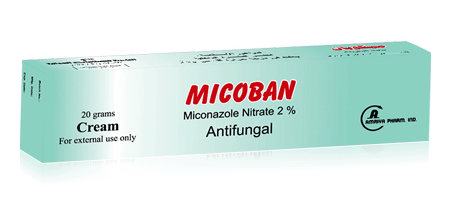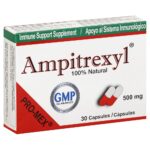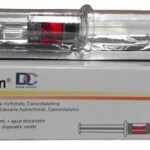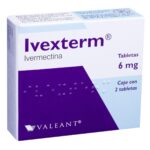Micoban: Uses, Side Effects, Warnings

Micoban topical cream is an antifungal medicine that contains Miconazole 2%. Miconazole is an azole antifungal that works by preventing the growth of fungus. Micoban is used to treat skin infections such as athlete’s foot, jock itch, ringworm, and other fungal skin infections (candidiasis). This medication is also used to treat a skin condition known as pityriasis (tinea versicolor), a fungal infection that causes a lightening or darkening of the skin of the neck, chest, arms, or legs.
Miconazole is in the imidazole family of medications. It works by decreasing the ability of fungi to make ergosterol, an important part of their cell membrane. Miconazole was patented in 1968 and approved for medical use in 1971. It is on the World Health Organization’s List of Essential Medicines.
How to use Micoban topical cream
Use Micoban topical cream on the skin only. Clean and thoroughly dry the area to be treated. Apply this medication to the affected skin, usually twice a day or as directed by your doctor. If you are using the spray form, shake the bottle well before applying. Dosage and length of treatment depends on the type of infection being treated. Do not apply this more often than prescribed. Your condition will not clear faster, but side effects may be increased. Apply enough medication to cover the affected area and some of the surrounding skin. After applying this medication, wash your hands.
Do not wrap, cover or bandage the area unless directed to do so by your doctor. Do not apply this medication in the eyes, nose, mouth, or vagina. Use this medication regularly in order to get the most benefit from it. Remember to use it at the same times each day. Continue to use this medication until the full prescribed amount is finished, even if symptoms disappear after starting miconazole. Stopping the medication too early may allow the fungus to continue to grow, which may result in a relapse of the infection. Inform your doctor if your condition persists or worsens.
Can I overdose on Micoban?
Micoban topical cream may be harmful if swallowed. If someone has overdosed and has serious symptoms such as passing out or trouble breathing, Call 911. Otherwise, call a poison control center right away. US residents can call their local poison control center at 1-800-222-1222. Canada residents can call a provincial poison control.
What are the side effects of Micoban topical cream?
Micoban topical cream can cause side effects such as burning, stinging, swelling, irritation, redness, pimple-like bumps, tenderness, or flaking of the treated skin. If any of these effects persist or worsen, notify your doctor or pharmacist promptly. If your doctor has directed you to use this Micoban topical cream, remember that he or she has judged that the benefit to you is greater than the risk of side effects. Many people using this medication do not have serious side effects.
Tell your doctor right away if any of these unlikely but serious side effects occur: blistering, oozing, open sores. A very serious allergic reaction to this drug is rare. However, seek immediate medical attention if you notice any symptoms of a serious allergic reaction, including: rash, itching/swelling (especially of the face/tongue/throat), severe dizziness, trouble breathing.
This is not a complete list of possible side effects. If you notice other effects not listed above, contact your doctor or pharmacist. In the US -Call your doctor for medical advice about side effects. You may report side effects to FDA at 1-800-FDA-1088 or at www.fda.gov/medwatch.In Canada – Call your doctor for medical advice about side effects. You may report side effects to Health Canada at 1-866-234-2345.
Micoban Safety Information
Before using Micoban topical cream, tell your doctor or pharmacist if you are allergic to it; or to other azole antifungals such as clotrimazole, econazole, or ketoconazole; or if you have any other allergies. This product may contain inactive ingredients, which can cause allergic reactions or other problems. Talk to your pharmacist for more details. Before using this medication, tell your doctor or pharmacist your medical history. During pregnancy, this medication should be used only when clearly needed. Discuss the risks and benefits with your doctor. It is not known whether this drug passes into breast milk. Consult your doctor before breast-feeding.
Does Micoban interact with any medication?
Your doctor or pharmacist may already be aware of any possible drug interactions and may be monitoring you for them. Do not start, stop, or change the dosage of any medicine before checking with your doctor or pharmacist first. Before using this medication, tell your doctor or pharmacist of all prescription and nonprescription/herbal products you may use. Keep a list of all your medications with you, and share the list with your doctor and pharmacist.
What should I know about storage and disposal of Micoban?
Keep this medication in the container it came in, tightly closed, and out of reach of children. Store it at room temperature and away from excess heat and moisture (not in the bathroom).
It is important to keep all medication out of sight and reach of children as many containers (such as weekly pill minders and those for eye drops, creams, patches, and inhalers) are not child-resistant and young children can open them easily. To protect young children from poisoning, always lock safety caps and immediately place the medication in a safe location – one that is up and away and out of their sight and reach. http://www.upandaway.org
Unneeded medications should be disposed of in special ways to ensure that pets, children, and other people cannot consume them. However, you should not flush this medication down the toilet. Instead, the best way to dispose of your medication is through a medicine take-back program. Talk to your pharmacist or contact your local garbage/recycling department to learn about take-back programs in your community. See the FDA’s Safe Disposal of Medicines website (http://goo.gl/c4Rm4p) for more information if you do not have access to a take-back program.
You can also find Useful Information on: Vagil: Uses, Dosage, Side Effects, Interactions





